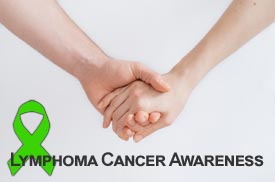Lymphoma Cancer Awareness: Early Detection of Lymphoma Cancer Through Symptoms and Review of Risk Factors Can Help Save Lives by Texas Lymphoma Cancer Lawyer Jason S. Coomer
As with many cancers early detection is important. Lymphoma is most likely to be cured, if it is diagnosed early and treated promptly. Typically, the first step in diagnosing lymphoma is through symptoms, medical examination, and a review of risk factors. Common signs and symptoms of lymphoma may include enlarged or swollen lymph nodes, cough, shortness of breath, fever, drenching night sweats, unintended weight loss, itching, and fatigue or constantly feeling tired.

Early Detection of Lymphoma Cancer Through Symptoms, Medical Tests, and Risk Factors
Though there is no routine standardized lymphoma screening test for individuals without symptoms, early detection is possible for both Hodgkin and non-Hodgkin lymphoma. The typical diagnostic process involves a physical exam and medical history, along with a biopsy and cell/blood tests. The blood tests or chemistry screens including a complete blood count and the lactate dehydrogenase test screen can be used to look for abnormal blood counts and certain chemicals in a person. If someone is experiencing symptoms, a bone marrow biopsy can also be performed to look for lymphoma cells. Additionally, in a person has abnormal blood tests, an abnormal biopsy, or is experiencing symptoms, physicians can use imaging tests to look for signs of lymphoma in other areas of their body. Imaging tests may include CT, MRI and positron emission tomography (PET). Overall, lymphoma is usually harder to detect in the earlier stages, but it is important to treat it as early as possible.
Further, an awareness of risk factors of lymphoma can be extremely useful. Below are several risk factors related to lymphoma cancer. If you or someone you love is experiencing symptoms of lymphoma cancer, you should probably discuss the symptoms with your physician as well as any of the below risk factors you may have:
- History of having the Epstein-Barr virus
- Having a close relative such as a parent or sibling who has had Hodgkin lymphoma
- Being older, white and/or male
- Exposure to Benzene
- Having any of the following immune diseases, conditions or disorders (hypogammaglobulinemia, Wiskott-Aldrich syndrome, rheumatoid arthritis, psoriasis, Sjögren’s syndrome, lupus, HIV/AIDS, or celiac disease)
- Taking immunosuppressant drugs after an organ transplant
- Exposure to certain pesticides
- Exposure to glyphosate herbicides including Roundup
- Recipient of Allergan Breast BIOCELL Implants and Tissue Expanders
- A diet high in meats and fat
- Past treatment for Hodgkin lymphoma
More Information on Lymphoma Cancer
For more information on Lymphoma Cancer, please feel free to go to the following web page: Mayo Clinic Information on Lymphoma.
No comments:
Post a Comment